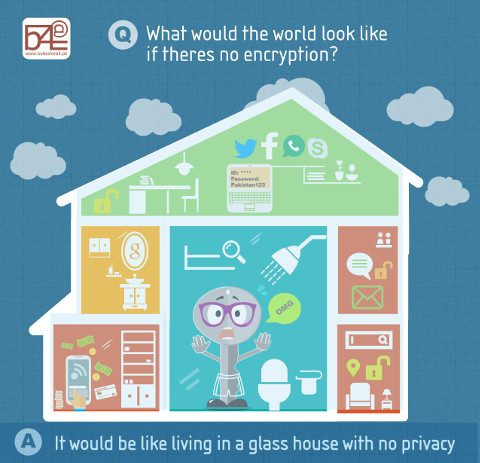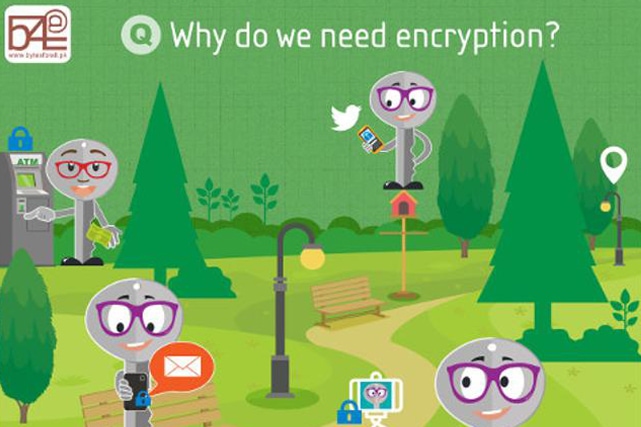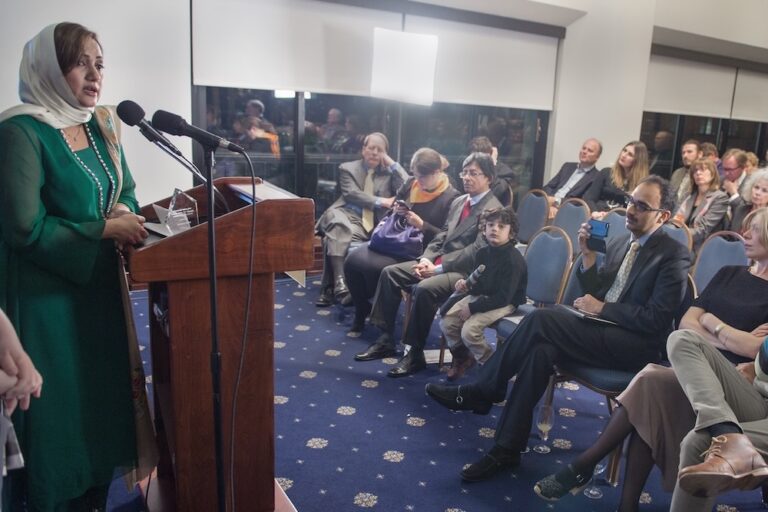Bytes for All, based in Pakistan, has released a series of graphics to help explain in simple terms why encryption is so important to our everyday lives and our freedom.
This statement was originally published on content.bytesforall.pk on 13 January 2016.
What is encryption and why do we need it? Today we’re releasing a series of graphics to help explain in simple terms why encryption is so important to our everyday lives and our freedom. For many people, “encryption” is an unfamiliar technical word related to cyber security and hackers. Even though many of us may not know it, almost all of us use encryption in some way every single day. If you are reading this on our website, or on our facebook page, then you should see a small padlock icon next to the address bar of your browser. That padlock indicates that all communication between your computer and our website server is hidden from third parties.
And you will find encryption everywhere. Whenever you access your email, when you do a Google search, when you make a bank transaction online, when you buy something online, or write a blog post, it’s very likely that your browser automatically encrypts your data before sending it to the server to ensure that random snoopers are not able to see what you are doing.
As we’ve tried to show in one of our cartoons, a world without encryption would be like living in a house with glass walls. Any passer-by would easily be able to see or steal everything we share or view online – our emails, bank account activity, online purchases, and even our Google search terms.
We need encryption for our privacy, and a reasonable expectation of privacy is essential for our freedom and safety.
How does encryption work?
In essence, encryption scrambles your data so that it isn’t readable to anyone unless they know how to unscramble back it into its original form. An extremely basic example, that we’ve shown in the cartoon below, is to take each letter of the message being encrypted, and replace it with the letter that follows it in the English alphabet. So if we were to encrypt the word “Hello”, then we would replace the letter “H” with “I”, “E” would become “F”, “L” would be come “M”, and so on. At the end, we would get “IMFFP” as our encrypted form of “Hello”.
You might have done something like this when you were in school, to pass secret messages to your friends in class. It might have worked well in school, but this simple kind of encryption is far too easy to guess, and so in the world of computing, no one would seriously use it. The kind of encryption employed by your browser and other encryption software uses far more complex algorithms. When encrypted properly, it would take an unauthorized person something in the order of millions of years to decrypt such a message using the computing power that exists today.
Resist curbs on encryption
In recent years, however, a number of governments around the world have tried vilify encryption or have moved to prevent individuals and technology companies from securely encrypting certain kinds of data. They want to do this either by putting legal restrictions on the right of individuals and companies to encrypt their data securely, or by requiring technology companies to share the encrypted data of its users (eg. UK, Brazil, USA, Pakistan, UAE).
These government claim that terrorists and criminals use encryption to hide their communications from law enforcement agencies trying to monitor them. However, as many critics have noted, criminals also use phones, cars, computers and shoes to carry out their crimes and banning any of these very useful things for the general public is not a reasonable crime-fighting measure.
Learn to encrypt and spread the word!
We believe the best way to respond to the attempts to put curbs on encryption is for everyone to learn about it and actively use it. There already exist a whole host of tools, developed by some of the brightest minds in the world, that make it easy to encrypt your data for all occasions. Most of the best encryption tools are absolutely free to use, copy and share (and even modify!). While it may take a little time to adjust, using these tools is not rocket science. For starters, we suggest you try out the Signal app (on Android and iOS) for encrypted instant messaging, and Tor for encrypted web browsing. You can browse through a whole index of other free privacy tools at prism-break.org. And there are dozens of guides available online – we recommend Security in-a-Box.
When you say I don’t care about the right to privacy because I have nothing to hide, that is no different than saying I don’t care about freedom of speech because I have nothing to say.
See more of the Bytes for All cartoons.

Bytes for All

Bytes for All



